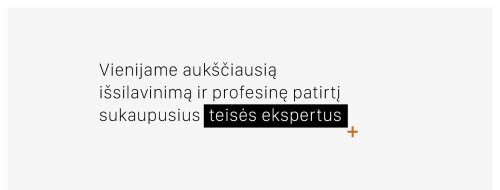Best Job Discrimination Lawyers in Kaunas
Share your needs with us, get contacted by law firms.
Free. Takes 2 min.
List of the best lawyers in Kaunas, Republic of Lithuania
About Job Discrimination Law in Kaunas, Republic of Lithuania
Job discrimination occurs when an employee or job seeker is treated unfairly on the basis of characteristics such as gender, age, ethnicity, disability, religion, or other protected grounds. In Kaunas, Republic of Lithuania, job discrimination is strictly prohibited by both national and European Union legislation. Legal frameworks protect employees and job candidates from discrimination during all stages of employment, including recruitment, promotion, pay, and termination. Understanding your rights can help you take action if you believe you have been affected by discriminatory practices.
Why You May Need a Lawyer
A lawyer with experience in job discrimination law can provide crucial support in various situations. Common reasons people in Kaunas seek legal advice include:
- Facing unfair treatment at work due to personal characteristics like gender, age, nationality, or disability
- Being denied a job, promotion, or training opportunity for discriminatory reasons
- Receiving unequal pay for the same work as others in similar positions
- Experiencing harassment or a hostile work environment based on a protected ground
- Believing their dismissal or redundancy was influenced by discrimination
- Dealing with retaliation for reporting or opposing discriminatory conduct
- Needing advice about complaints procedures or legal action
A lawyer can explain your rights, help gather evidence, guide you through official complaints and legal processes, and represent you in negotiations or court if necessary.
Local Laws Overview
Lithuania's main legal instrument addressing job discrimination is the Law on Equal Treatment (Lygių galimybių įstatymas). This law prohibits direct and indirect discrimination in employment, including both public and private sectors, on grounds such as age, gender, race, ethnicity, religion, disability, sexual orientation, and others. The Labour Code of the Republic of Lithuania also sets out anti-discrimination provisions and ensures equal rights and opportunities for all employees. Both laws require employers to prevent discrimination, respond to complaints, and create an inclusive environment.
The Equal Opportunities Ombudsperson's Office is a key institution that investigates complaints, monitors compliance, and provides support to victims of discrimination. Court actions can be pursued in serious cases. Furthermore, as Lithuania is part of the European Union, EU directives on anti-discrimination also apply in Kaunas.
Frequently Asked Questions
What counts as job discrimination in Kaunas?
Job discrimination includes any unfavorable treatment based on protected characteristics such as gender, age, ethnicity, religion, disability, sexual orientation, or political beliefs, in areas like hiring, pay, promotion, or termination.
Does the law protect job applicants or only current employees?
The law covers both employees and job applicants, ensuring fair treatment during both the recruitment process and employment period.
What should I do if I experience discrimination at work?
You should document the incidents, report the situation to your employer or human resources department, and consider seeking advice from the Equal Opportunities Ombudsperson or a qualified lawyer.
Can I file a complaint about discrimination if I am not a Lithuanian citizen?
Yes, all individuals working or seeking work in Lithuania, regardless of nationality, are protected against discrimination under Lithuanian law.
What is the role of the Equal Opportunities Ombudsperson?
The Ombudsperson investigates discrimination complaints, monitors employer practices, provides recommendations, and can mediate disputes between employees and employers.
Is it discrimination if I am paid less than my colleagues?
If the pay difference is based on protected grounds, such as gender or ethnicity, and not on objective factors like experience or qualifications, it may constitute unlawful discrimination.
What is indirect discrimination?
Indirect discrimination occurs when a seemingly neutral workplace policy or practice disadvantages a group protected by law, unless the policy can be objectively justified.
Can I be punished for reporting workplace discrimination?
No, retaliation or victimization for reporting or opposing discrimination is expressly prohibited by law.
What kind of evidence will I need for a discrimination claim?
Useful evidence includes written correspondence, witness accounts, pay slips, employment policies, and any records of relevant incidents or discussions.
How long do I have to file a discrimination complaint?
There are time limits for filing complaints, which can depend on the nature of your case. It is important to seek legal advice promptly to ensure you do not miss any deadlines.
Additional Resources
Several governmental bodies and organizations can offer information, support, or handle complaints related to job discrimination in Kaunas:
- Equal Opportunities Ombudsperson's Office – Investigates discrimination cases and provides assistance
- State Labour Inspectorate – Offers information on workers' rights and monitors labour law compliance
- National Labour Exchange – Advises job seekers on their rights and opportunities
- Human Rights Monitoring Institute – Provides resources and legal advice on equality issues
- Local legal aid offices – Assist with legal representation or referrals
Next Steps
If you suspect you are experiencing job discrimination in Kaunas, here is what you should do:
- Document all relevant events, communications, and evidence as soon as possible.
- Raise the issue internally with your employer, HR department, or designated workplace equality officer if available.
- Contact the Equal Opportunities Ombudsperson or a local legal aid office for advice and guidance on your options.
- If informal resolution is not possible, consider filing a formal complaint with the relevant authority or seeking representation from a qualified lawyer.
- Stay within legal timeframes to ensure your rights are protected.
Prompt action and legal advice can help you protect your rights, prevent further harm, and seek the remedies you deserve.
Lawzana helps you find the best lawyers and law firms in Kaunas through a curated and pre-screened list of qualified legal professionals. Our platform offers rankings and detailed profiles of attorneys and law firms, allowing you to compare based on practice areas, including Job Discrimination, experience, and client feedback.
Each profile includes a description of the firm's areas of practice, client reviews, team members and partners, year of establishment, spoken languages, office locations, contact information, social media presence, and any published articles or resources. Most firms on our platform speak English and are experienced in both local and international legal matters.
Get a quote from top-rated law firms in Kaunas, Republic of Lithuania — quickly, securely, and without unnecessary hassle.
Disclaimer:
The information provided on this page is for general informational purposes only and does not constitute legal advice. While we strive to ensure the accuracy and relevance of the content, legal information may change over time, and interpretations of the law can vary. You should always consult with a qualified legal professional for advice specific to your situation.
We disclaim all liability for actions taken or not taken based on the content of this page. If you believe any information is incorrect or outdated, please contact us, and we will review and update it where appropriate.
















